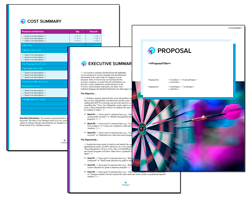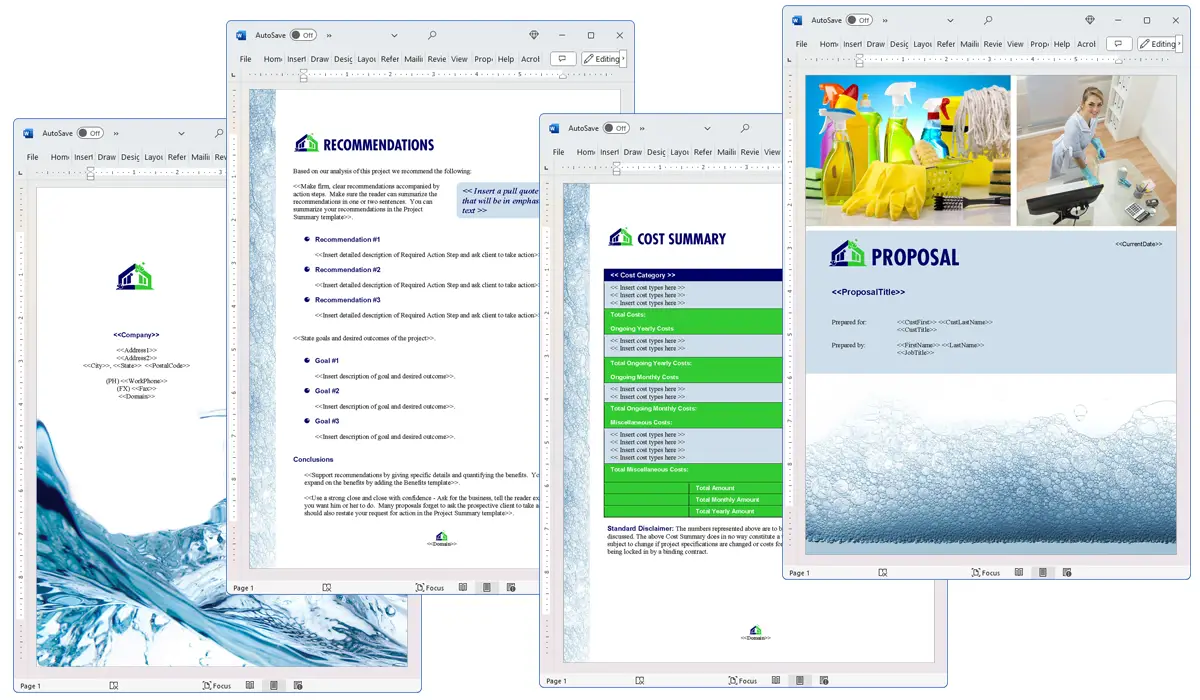What is the Artifacts chapter used for?
Proposal Kit Professional Bundle adds more design themes, all six Contract Packs,
a project management library, and Expert Edition software.

Illustration of Proposal Pack Construction #8
We include this Artifacts chapter template in every Proposal Pack, along with thousands more. You assemble this chapter with others in various combinations to create custom-tailored business proposals, plans, reports, and other documents. Proposal Packs apply custom visual designs to the templates, giving the final documents a consistent professional finish.
 DOWNLOADABLE, ONE-TIME COST, NO SUBSCRIPTION FEES
DOWNLOADABLE, ONE-TIME COST, NO SUBSCRIPTION FEES
Overview of the Artifacts Chapter
The Artifacts chapter is a specialized part of the Proposal Kit system, designed to cater to proposals involving historical, cultural, or scientific items. This chapter helps organizations, particularly museums and non-profits, to outline their needs and plans regarding the management of artifacts. Whether it's for acquisition, preservation, or disposal, this chapter provides a structured way to present relevant information that supports the proposal's objectives.
How is the Artifacts Chapter Used?
In a business proposal, the Artifacts chapter is used to detail specific information about items that are of cultural, historical, or scientific importance. It serves as a dedicated section where organizations can discuss the status, significance, and requirements of these items. This helps in creating a clear picture for potential funders or stakeholders about the importance of the artifacts and why they need attention, highlighting the implications of their management.
What is Included in the Artifacts Chapter?
Typically, the Artifacts chapter includes:
- A detailed description of each artifact, including its history, current condition, and cultural significance.
- The needs for preserving or restoring the artifacts, if applicable.
- Plans or proposed actions to be taken for the artifacts, such as display, storage, or educational use.
- Any legal or ethical considerations related to the artifacts.
- Funding requirements or financial implications to manage the artifacts effectively.
Use Case Examples for the Artifacts Chapter
- Fashion: In a proposal for a fashion exhibition, detailing the historical garments to be displayed and the necessary conditions for their preservation.
- Image: For a photography archive, describing the collection of vintage prints that need digitization and proper archival.
- Art: In a proposal to obtain funding for acquiring new artworks by emerging artists for a gallery.
- Grants: Applying for funds to preserve endangered artifacts in a local museum.
- Non-Profits: A historical society seeking support for a project to catalog and restore ancient manuscripts.
- Research: Scientists proposing to study ancient biological specimens and needing funds for their preservation.
- Science: A proposal for funding a project to digitize and create an online database of geological specimens.
- Plans: Outlining the steps a museum will take to rotate artifacts in exhibitions to reduce wear while maintaining public interest.
- Reports: Generating a detailed report on the state of artifacts recovered from a recent archaeological dig.
- Studies: Conducting studies on the restoration techniques and their effectiveness on different types of artifacts.
- Physical Items: Proposals involving the transfer or loan of significant artifacts between institutions for special exhibitions.
Key Takeaways
- The Artifacts chapter is important for proposals that deal with the management of historical, cultural, or scientific items.
- It helps organizations clearly communicate the significance, condition, and needs of artifacts to stakeholders and funders.
- This chapter is and can be adapted for use in various fields including arts, science, and education.
- Proper use of the Artifacts chapter can significantly enhance the persuasiveness of a proposal.
- The structured format of the Artifacts chapter ensures all necessary details are covered, facilitating better understanding and decision-making by the proposal reviewers.

Illustration of Proposal Pack Bullseye #3
 What Our Clients Say
What Our Clients SayWriting proposals for government and business entities is an ongoing, time consuming task for every company I have operated or consulted with. The difference between a poor proposal and a great proposal often boils down to how many hours talented people can dedicate to the process. The Proposal Pack has proven to be an excellent tool that allows my teams to create superior proposals in a fraction of the time they would otherwise take. I highly recommend this product."
Acumen Partners, LLC
 4.7 stars, based on 849 reviews
4.7 stars, based on 849 reviewsRelated Chapters

The Artifacts chapter and other chapters are integrated into a Word document as illustrated here in the Proposal Pack Janitorial #3 design theme. There are hundreds of design themes available, and every design theme includes the Artifacts chapter template.
A proper business proposal will include multiple chapters. This chapter is just one of many you can build into your proposal. We include the complete fill-in-the-blank template in our Proposal Pack template collections. We also include a library of sample proposals illustrating how companies in different industries, both large and small, have written proposals using our Proposal Packs. This template will show you how to write the Artifacts.
We include a chapter library for you to build from based on your needs. All proposals are different and have different needs and goals. Pick the chapters from our collection and organize them as needed for your proposal.
Using the Proposal Pack template library, you can create any business proposal, report, study, plan, or document.
The Wizard software includes an AI Writer, which will write the content of this and any other chapter of your document. Use the AI Writer to do the heavy lifting, writing the first draft of your proposal or business document in minutes.
 Ian Lauder has been helping businesses write their proposals and contracts for two decades. Ian is the owner and founder of Proposal Kit, one of the original sources of business proposal and contract software products started in 1997.
Ian Lauder has been helping businesses write their proposals and contracts for two decades. Ian is the owner and founder of Proposal Kit, one of the original sources of business proposal and contract software products started in 1997.By Ian Lauder
 Published by Proposal Kit, Inc.
Published by Proposal Kit, Inc.


 Cart
Cart
 Facebook
Facebook YouTube
YouTube Bluesky
Bluesky Search Site
Search Site